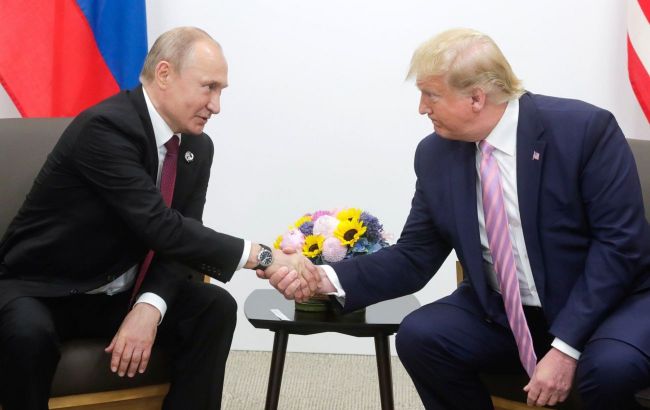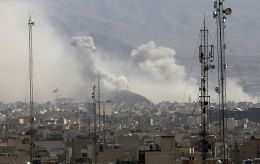Trump preparing call to Putin: What Ukraine can expect
 Photo: Donald Trump and Vladimir Putin may soon have their first contact (Getty Images)
Photo: Donald Trump and Vladimir Putin may soon have their first contact (Getty Images)
US President-elect Donald Trump has instructed to organize a telephone conversation with Russian dictator Vladimir Putin. This conversation is expected to take place in the days following his inauguration on January 20, 2025.
What to expect from the first contact, whether they will agree to meet, and whether steps will be taken to end the Russian-Ukrainian war, read in the RBC-Ukraine article.
Contents
- Trump preparing conversation with Putin: Details
- What Trump and Putin can discuss about Ukraine
- Will there be ceasefire in Ukraine after first contact
Trump preparing conversation with Putin: Details
The day before his inauguration, the next US president made another peacemaking statement.
“I will end the war in Ukraine, stop the chaos in the Middle East, and prevent World War III – and you have no idea how close we are to it,” he said during a rally at the Capitol One Arena in Washington, DC.
Before the election, Trump promised to end the Russian-Ukrainian war within 24 hours of being sworn in. But on the eve of the inauguration, with little to indicate that the nearly three-year war is close to ending, it is safe to say that this promise will not be fulfilled.
Instead, Trump and his team hope to quickly start working on a peace plan that can be implemented in the first months of the presidency, including through direct talks with Vladimir Putin.
According to CNN, he instructed aides to organize a phone call in the coming days. The team began preparing for the first contact several weeks ago, but it is still unclear whether a date has been set.
As soon as Trump officially takes office, American and Russian officials will be able to begin preparing for a face-to-face meeting in earnest. Switzerland and Serbia have already said they are ready to host such a summit.
Direct talks with Putin would reflect a sharp departure from the policy of Joe Biden, who feared that personal contacts would not be useful in resolving the Russian-Ukrainian war. Trump believes otherwise, and according to a person close to him, direct interaction with Putin is exactly what is needed to find a solution to end the war, CNN notes.
It is not yet known whether Trump plans to continue the strategy of providing Ukraine with weapons and intelligence. Aside from his opposition to Ukraine joining NATO, he did not say what guarantees he would be willing to accept to satisfy Ukrainian leader Volodymyr Zelenskyy. He also did not specify who would pay for Ukraine's reconstruction, although judging by his past comments, it is unlikely to be the United States.
Perhaps some light will be shed on the results of the phone call with Putin. CNN sources claim that the purpose of the upcoming call is to discuss the possibility of a face-to-face meeting in the coming months to try to end the war in Ukraine.
What Trump and Putin can discuss regarding Ukraine
Today, everything indicates that such a conversation may take place in the coming days.
“We shouldn't be afraid of this, because sooner or later the conversation will happen anyway. The best thing that Ukraine can do is to prepare Trump's environment as much as possible and convey our main warnings,” Vladyslav Faraponov, head of the Institute of American Studies and analyst at Internews Ukraine, told RBC-Ukraine.
According to him, Trump has an understanding of why the war cannot be ended quickly, and Ukraine has been working to form this understanding.
“Just like after the US election, the most difficult task remains to stop Trump's desire to achieve an image victory in the form of negotiations and a ceasefire on any terms,” the source said.
He also draws parallels with the ceasefire in the Gaza Strip that came into effect the day before, on January 19. Although Trump's special representative Steven Witkoff took part in those negotiations, the Joe Biden administration can formally claim a breakthrough in the Middle East as its asset, and the new president also needs to show his peacemaking skills, Faraponov believes.
Therefore, it is highly likely that the main topic of Trump's conversation with Putin will be the ceasefire in Ukraine.
“I don't think Putin will talk about his imperial ambitions and so on. First and foremost, they will talk about the ceasefire,” the analyst added.
Will there be ceasefire in Ukraine after first contact
Trump could potentially achieve a ceasefire in Ukraine. But not after the first contact with Putin, Faraponov believes.
“On the one hand, Moscow will show interest, but on the other hand, it will say it's not that simple and put forward some more demands. Putin will not agree to a ceasefire that easily and will want to lead the US by the nose. A ceasefire will require several iterations,” the source said.
Putin may try to bargain for at least a partial lifting of sanctions. However, it is unlikely that this will be discussed during the first call. Most likely, after he has lured Trump into a personal meeting, which would be considered a breakthrough for the new US administration.
“But in the end, Putin will look for ways to, roughly speaking, deceive Trump: demonstrate readiness for a meeting and peace talks, but then put forward conditions regarding Ukraine that Trump will not accept,” Faraponov said.
The meeting itself is important for Putin himself, as he has recently spoken personally only with the leaders of Iran, North Korea, China, and Belarusian dictator Alexander Lukashenko. And direct talks with the new US president will be a boost to his media and political activity.
At the same time, if Putin insists on impossible points, Trump will conclude his negotiating ability relatively quickly. It is difficult to say whether this means that the American president will take a sharply pro-Ukrainian position in this case.
“We don't know, it's a very abstract question. However, the scenario that Ukraine does not negotiate and loses US aid, or Russia refuses to negotiate and Ukraine receives more aid, remains realistic. I think Trump may stick to this configuration at least in the coming weeks,” the analyst added.
Sources: Donald Trump's statement, CNN publication, and commentary by Vladyslav Faraponov, head of the Institute of American Studies, and analyst at Internews Ukraine.

